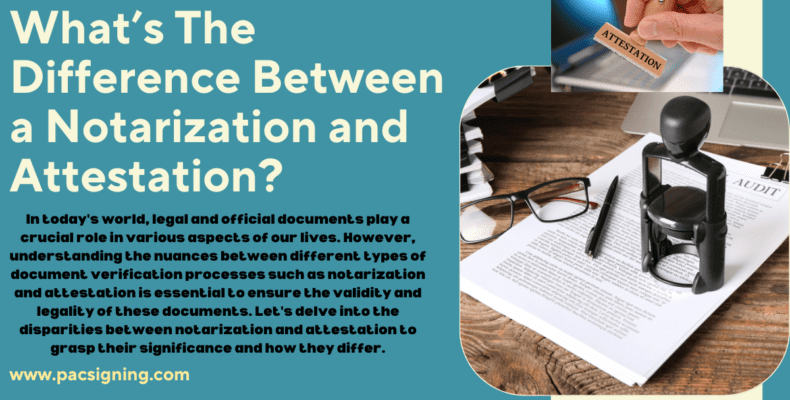In today’s world, legal and official documents play a crucial role in various aspects of our lives. However, understanding the nuances between different types of document verification processes such as notarization and attestation is essential to ensure the validity and legality of these documents. Let’s delve into the disparities between notarization and attestation to grasp their significance and how they differ.
Understanding Notarization
What is notarization?
Notarization is the process of certifying a document by a notary public, who is a neutral third-party appointed by the government to witness the signing of documents and verify the identity of the signatories.
Purpose of notarization
The primary purpose of notarization is to deter fraud and ensure the authenticity of documents. Notarized documents carry the seal and signature of the notary public, providing a layer of credibility and legal validity.
How notarization works
During the notarization process, the notary public verifies the identity of the signatories, ensures their willingness to sign the document, and confirms their understanding of the content. Once satisfied, the notary affixes their seal and signature to the document.
Understanding Attestation
What is attestation?
Attestation involves the certification of documents by authorized authorities, such as government departments, embassies, or consulates. It verifies the authenticity of the document and the signatures appended to it.
Purpose of attestation
How attestation works
Attestation is typically carried out by government authorities or designated agencies. The process involves verifying the authenticity of the document, including signatures, stamps, and content, before endorsing it with their seal and signature.
Key Differences Between Notarization and Attestation
Legal implications
Notarization primarily serves to prevent fraud and ensure the authenticity of documents within a specific jurisdiction, whereas attestation is required for documents intended for use in foreign countries or legal jurisdictions.
Scope of application
Notarization is commonly used for various legal documents, including affidavits, deeds, and powers of attorney, within the jurisdiction where the notary is authorized. In contrast, attestation is necessary for documents that need to be recognized internationally, such as educational certificates, marriage certificates, and commercial documents.
Authority
Notaries public are appointed by the government to perform notarial acts within their jurisdiction, while authorities responsible for attestation may vary depending on the type of document and the country involved.
Process and procedure
The notarization process typically involves the physical presence of the signatories before the notary, who verifies their identity and witnesses the signing of the document. On the other hand, attestation may require additional steps, such as authentication by government authorities and diplomatic missions, especially for documents intended for use abroad.
When to Use Notarization
Notarization is necessary for documents that require legal validity within a specific jurisdiction, such as contracts, affidavits, wills, and property deeds.
When to Use Attestation
Attestation is essential for documents intended for use in foreign countries, including educational certificates, employment contracts, business agreements, and immigration-related documents.
Importance of Notarization and Attestation
Both notarization and attestation play vital roles in ensuring the authenticity and legality of documents, thereby facilitating various transactions, legal proceedings, and international activities.
Common Misconceptions
Benefits of Proper Documentation
Legal Validity
What is the main purpose of notarization?
Notarization serves several purposes, but its primary goal is to deter fraud and ensure the authenticity of documents. When a document is notarized, it signifies that the signer appeared before a notary public, provided satisfactory evidence of identity, and acknowledged the document voluntarily. Notaries are impartial witnesses who verify the identity of the signer, ensure they are of sound mind and aware of the contents of the document, and then officially witness the signing. By affixing their seal and signature, the notary certifies that these procedures were followed, adding an extra layer of credibility to the document. This process helps prevent forgery, fraud, and disputes over the validity of the document.
Can a notarized document be rejected?
While notarization adds credibility and authenticity to a document, it does not guarantee acceptance in all situations. Notarized documents can still be rejected if they fail to meet legal requirements, contain errors, or raise suspicions about their validity. Common reasons for rejection include incomplete or inaccurate information, improper notarization procedures, or suspicions of fraud. Additionally, certain institutions or individuals may have specific requirements or standards for accepting notarized documents. It’s essential to ensure that the document meets all necessary criteria and that the notarization process complies with legal standards to minimize the risk of rejection.
Is attestation required for all documents?
No, attestation is not required for all documents. It is typically necessary for documents intended for use in foreign countries or legal jurisdictions outside the issuing authority’s jurisdiction. Examples of documents that often require attestation include educational certificates, employment contracts, marriage certificates, birth certificates, and commercial documents. The purpose of attestation is to verify the authenticity of the document and ensure its recognition and acceptance in the target country or jurisdiction. The specific requirements for attestation may vary depending on the destination country’s regulations and the type of document being attested.
How long does the notarization process take?
The duration of the notarization process can vary depending on various factors, including the complexity of the document, the availability of the notary public, and any additional requirements or procedures involved. In simple cases, such as notarizing a straightforward document like a signature or an affidavit, the process may take only a few minutes. However, for more complex documents or situations requiring additional verification or documentation, the process may take longer, potentially extending to an hour or more. It’s advisable to schedule an appointment with the notary in advance, especially for time-sensitive documents or during peak periods when notary services may be in high demand.
Conclusion
In conclusion, while notarization and attestation serve similar purposes of certifying documents, they differ in their scope, authority, and process. Understanding these differences is crucial for ensuring the legality and validity of documents, whether used domestically or internationally.

